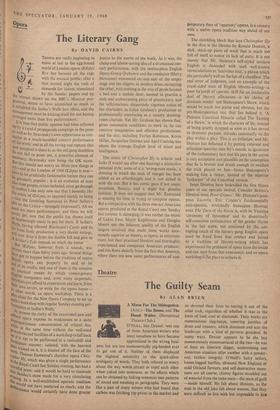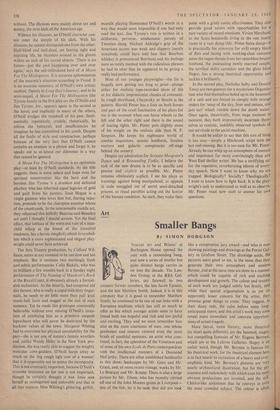The Guilty Seam
Theatre
By ALAN BRIEN
A Moon For The Misbegotten. (Arts.)—The Room, and The Dumb Waiter. (Hampstead Theatre Club.) O'NEILL, like Dreiser, was one of those American writers who seem somehow to have become apprenticed in the wrong busi- ness but are too monumentally pig-headed ever to get out of it. Neither of them displayed the slightest sensitivity to the quick-silver ambiguity of words. They both refused to worry about the way words attract or repel each other when yoked into sentences, or the effects which can be obtained by linking sentences into patterns of sound and meaning as paragraphs. They were like a pair of crazy miners who had heard that carbon was fetching top prices in the market and so devoted their lives to tearing it out of the solid rock, regardless of whether it was in the form of lead, coal or diamonds. Their works are mountainous slag-heaps, towering jumbles of dross and treasure, which dominate and scar the landscape with a kind of perverse grandeur. In many ways, Dreiser appears to be the less monotonously monomaniacal of the two—he was at least an itinerant digger, undermining one American situation after another with a ponder- ous, tireless integrity. O'Neill's hairy sailors, booze-logged barflies, obsessed New England or ould Oirland farmers, and self-destructive mum- mers are all coarse, clumsy figures moulded out of material from the same seam—the seam of guilt —inside himself. He felt about illusions, as the man in the old joke felt about women, that they were difficult to live with but impossible to IN* without. The illusions were mainly about sex and money, the twin idols of the American age.
Without his illusions, an O'Neill character can- not enter the temple of his idols. With his illusions, he cannot distinguish one from the other. Half-blind and half-dead, yet fearing sight and rejecting life, he blunders around in the gloom within an inch of his sacred objects. 'There is no future—just the past happening over and over again,' says the self-infibulated hero of A Moon For The Misbegotten. It is accurate epitomisation of the neurotic's situation according to Freud. It is an accurate summary of O'Neill's own artistic method. Openly in Long Day's Journey, and in its semi-sequel, A Moon For The Misbegotten (the Tyrone family in the first play are the O'Neills and Jim Tyrone, .Thr., appears again in the second as the hero), and implicitly in many of the others, O'Neill trudges the treadmill of his past. Senti- mentally, repetitively, crudely, rhetorically, he relives the betrayals and insufficiencies he imagines he has committed in his youth. Despite all the faults of style and construction, perhaps because of the very fact that O'Neill cannot embalm an emotion in a phrase and forget it, he speaks out to us /about our dilemmas in a way that cannot be ignored.
A Moon For The Misbegotten is an optimistic play—at least by O'Neill standards. As the title suggests, there is some solace and hope even for spiritual monstrosities like the hero and the heroine. Jim Tyrone is a drunken and defeated playboy who has inherited equal legacies of gold and guilt from his parents. Josie Hogan is a virgin giantess who loves him but, fearing rejec- tion, pretends to be the champion amateur whore of the countryside. In the interminable middle act, they rehearsed this hillbilly Beatrice-and-Benedict act until I thought I should scream. Yet the final effect, that tableau of the worn-out ruin of a man- child asleep' at the breast of the immortal madonna, has a heroic simplicity about its symbol- ism which a more sophisticated and elegant play- wright could never have achieved.
The Arts Theatre production, by Clifford Wil- liams, seems at any moment to be too slow and too emphatic. But it contains two startlingly fresh and subtle performances. Colin Blakely, who was so brilliant a few months back in a Sunday night performance of The Naming of Murderer's Rock at the Royal Court, is obviously already a formid- able technician. As the miserly, bad-tempered old dirt farmer, who is really a cupid with dirty finger- nails, he needs to do little more than pull Irish music-hall faces and stagger at the end of each sentence. Yet he made this grotesque continually believable without ever missing O'Neill's inten- tion of exhibiting him as a primitive unspoilt leprechaun who will never be destroyed by the huckster values of the town. Margaret Whiting had to overcome her physical unsuitability for the part—she is not one of nature's female wrestlers and, unlike Wendy Hiller in the New York pro- duction, she was rarely able to suggest the weighty muscular corn-goddess. O'Neill harps away so much on the 'big rough ugly cow of a woman' that it is impossible not to notice the incongruity. This is not eventually important, because O'Neill's tiresome insistence on her size is not important, though he certainly thought it was. Josie sees herself as misbegotten and unlovable and that is all that matters. Miss Whiting's glittering, girlish, moonlit playing illuminated O'Neill's words in a way that would seem impossible if one had only read the text. Jim Tyrone's role is written in a deliberate, perverse, unidiomatic parody of Twenties slang. Michael Aldridge's grip of the American accent was weak and slippery (surely somebody could have told him that Bourbon whiskey is pronounced Burrbun) and his feelings were so rarely meshed with the ridiculous phrases he had to utter that he appeared to be giving a really bad performance.
Most of our younger playwrights—the list is happily now getting too long to print—plunge either for realistic tape-recorded slices of life or for didactic impressionist chunks of comment. In rough shorthand, Chayevsky or Brecht is the pattern. Harold Pinter has a foot on both horses and part of the cruel fascination of his plays for me is the moment when one horse wheels to the left and the other right and there is the sound of tearing tights. Mr. Pinter puts slightly more of his weight on the realistic side than N. F. Simpson. He keeps his nightmare world of zombie inquisitors, satanic landlords, faceless martyrs and galactic conspiracies off-stage behind the scenery.
Despite my admiration for Serjeant Mu.sgrave's Dance and A Resounding Tinkle, I believe the task of the new drama is to be as specific and precise and explicit as possible. Mr. Pinter remains obstinately a-plicit. I see his plays as warnings against being manipulated, as appeals in code smuggled out of secret semi-detached prisons, as ritual parables acting out the horror of the human condition. As such, they make their point with a grisly comic effectiveness. They also provide good actors with opportunities for a rare variety of mixed emotions. Vivien Merchant, as the Scots housewife living in the one lonely room in a vast damp (Mr. Pinter hates damp—ft is practically his synonym for evil) empty block of flats and facing with working-class common sense the vague threats from her speechless bruiser husband, the insinuating newly married couple, the terrified shifty caretaker and the glum blind Negro, has a strong theatrical opportunity and tackles it brilliantly.
In the second play, Nicholas Selby and Donald Tovey are two gunmen for a mysterious Organisa- tion who find themselves holed up in the basement of a cafe and are forced to comply with strange orders for 'soup of the day, liver and onions, and jam tart' which rumble down the dumb waiter. Once again, theatrically, from stage moment to moment, they both impressively incarnate them- selves as realistic, indelibly observed symbols of our servitude to the social machine.
It would be unfair to say that this sort of thing is too easy—simply a Hitchcock script with the last reel missing. But it is too easy for Mr. Pinter. Already he can whip up an atmosphere of menace and impotence far more convincingly than any West End thriller writer. He has a terrifying ear for the repetitive, reverberating idioms of every- day speech. Now I want to know why we are trapped. Biologically? Socially? Theologically? I want to know how to fight back. It is the play- wright's task to understand as well as to observe. Mr. Pinter must now start to answer his own questions.







































 Previous page
Previous page